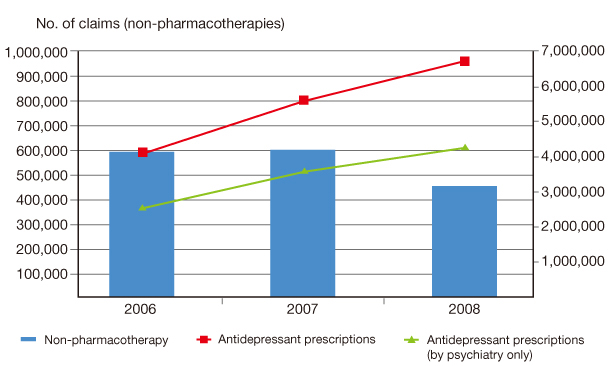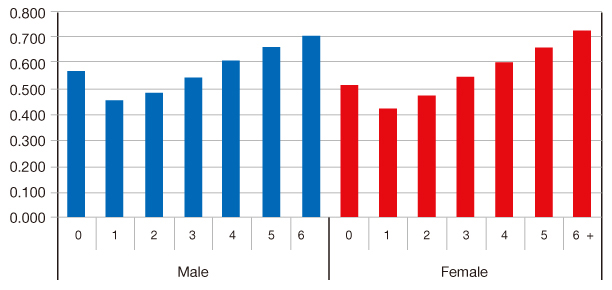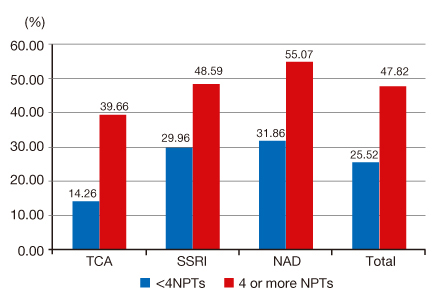J Korean Med Assoc.
2011 Apr;54(4):381-385. 10.5124/jkma.2011.54.4.381.
A study on the relationship between non-pharmacological treatments and adherence to antidepressant pharmacotherapies in Korea
- Affiliations
-
- 1National Evidence-based Healthcare Collaborating Agency (NECA), Seoul, Korea. jahn@neca.re.kr
- KMID: 2190419
- DOI: http://doi.org/10.5124/jkma.2011.54.4.381
Abstract
- Non-pharmacological treatments (NPTs) including psychotherapies and behavioral therapies have proven to be an effective treatment tool for patients with depression. More importantly, NPTs reduce drop-out rates for pharmacotherapy when combined with it. Given that one of the major obstacles to effective treatment of depression is low adherence to antidepressant therapies, NPTs deserve more attention in treating patients with depression. This study aims to analyze the current status of NPTs for patients with depression and the relationship with adherence to antidepressant therapies in Korea. The Health Insurance Review Agency (HIRA)'s claims database from 2006 to 2008 was used in the analysis and those patients with at least one inpatient diagnosis with depression or twice diagnosed in outpatient services were included in the analysis (n=290,188). NPTs were identified by HIRA treatment codes in each claim except a routine care treatment (HIRA treatment code, NN011). Adherence to antidepressant therapies was defined as 180-day medication possession ratio. The claims for NPTs decreased almost 25% in 2008 while the number of patients with depression and the claims for antide-pressants were consistently increasing during the same period. Those patients with claims for 4 or more NPTs showed a higher adherence rate than those without. The downward trend of NPT use deserves more attention since it may reduce adherence to pharmacotherapies and increase future medical costs through more relapses from the lowered adherence rates.
Figure
Reference
-
1. Depression in parents, parenting, and children: opportunities to improve identification, treatment, and prevention [Internet]. Committee on Depression, Parenting Practices, and the Healthy Development of Children. 2009. cited 2011 Mar 17. Washington, DC: National Academies of Press;Available from: http://www.nap.edu/catalog/12565.html.2. de Mello MF, de Jesus Mari J, Bacaltchuk J, Verdeli H, Neugebauer R. A systematic review of research findings on the efficacy of interpersonal therapy for depressive disorders. Eur Arch Psychiatry Clin Neurosci. 2005. 255:75–82.
Article3. Deckersbach T, Gershuny BS, Otto MW. Cognitive-behavioral therapy for depression. Applications and outcome. Psychiatr Clin North Am. 2000. 23:795–809.4. Clinical Research Center for Depression. Korean Standard Korean non-pharmacological treatment guideline for depression. 2010. Seoul: Clinical Research Center for Depression.5. Oh HS, Lee HW, Park YC. The current status and requirements for non-pharmacological treatment of depression in Korea. Korean J Biol Psychiatry. 2007. 14:21–27.6. Akincigil A, Bowblis JR, Levin C, Walkup JT, Jan S, Crystal S. Adherence to antidepressant treatment among privately insured patients diagnosed with depression. Med Care. 2007. 45:363–369.
Article7. Kim NS, Kim KH, Lee SM, Baek JW, Lee BR, Hwang JH. Current status of healthcare utilization and quality for patients with depression in Korea. 2008. Seoul: Health Insurance Review and Assessment Service.8. Young AS, Klap R, Sherbourne CD, Wells KB. The quality of care for depressive and anxiety disorders in the United States. Arch Gen Psychiatry. 2001. 58:55–61.
Article




